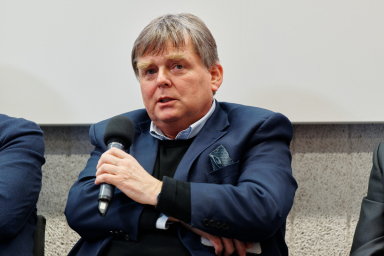The Czech Republic has a strong policy in place to reduce the risks of addictive behaviour, based on scientific evidence and a broad professional and political consensus. The commitment to harm reduction principles has been and is part of the Programme Declaration of the past and present governments. It is therefore now necessary for all Government Ministries to join forces and fully implement the policy into legislation and practice. This was one of the main conclusions reached by leading experts and politicians at the fourth annual international conference of the Healthcare Journal, The Economics of Prevention, held in Prague. Risk reduction is one of the principal areas on which recommendations were adopted at the conference – others include preventive screening, vaccination, pharmacotherapy, mental health and education. The conference was attended by leading physicians, Government Ministers, MPs from the Czech and Slovak Republics, MEPs, Directors of health insurance companies, well-known athletes – winners of the Olympics and World Championships, as well as economists from several European countries.
„When it comes to addictions, reducing the risks and harm of smoking is one of the pillars of helping people,“ says Slovak Health Minister Zuzana Dolinková.
Using the case study of famous Czech singer Marta Kubišová, Professor Petr Neužil, head of the cardiology department at the Na Homolce Hospital, illustrated how this type of prevention can help. Kubišová smoked a pack a day since she was 17. When she suffered an acute heart attack in 2015, she was diagnosed with chronic ischemic heart disease. Two years later, the singer switched from traditional cigarettes to vaping.
„We have tried very intensive treatment using hypolipidemics, but many of them have not been tolerated and we are on lower doses than we should be. In 2017 we did a follow-up exam and complete coronary angiography. Seven years after she quit cigarettes, a catheterization was performed this September with minimal non-aggressive hypolipidemic therapy ongoing. And we were surprised to find what we could classify as a mild regression of coronary atherosclerosis,“ says Professor Neužil.

If we support the transition to alternatives to cigarettes, he said, we could end up where Sweden is now. There, since the 1970s, the consumption of snus, banned in other European countries, has been increasing, whilest the consumption of conventional cigarettes has fallen. As a result, the prevalence of smoking in Sweden is now the lowest in the EU at 5.6 percent. The fact that there is a preventive effect is demonstrated by the lowest incidence and mortality rates for lung cancer and the lowest cancer mortality rates for men. Meanwhile, an observational study of 400 000 Swedes found no association between snus chewing and the incidence of oral cancer.
„What happened in Sweden it truly miraculous – a decline in lung cancer, heart disease and, above all, premature deaths,“ says Jindřich Vobořil, an adviser to the Prime Minister and an expert on addiction. This approach can save health and lives. „Smoking is our biggest killer. In general, the substitution brought about by the market works very well. The tobacco companies have come up with interesting products that people have reached for because, unlike nicotine patches, they work,“ says Vobořil.
Mohlo by vás zajímat

While experts repeatedly stress that people should not smoke at all, given the unrealistic nature of such a wish, at least harm reduction is in order. „The ideal situation is not to smoke. However, both heated tobacco and electronic cigarettes have a carcinogenic load of around five to seven percent, which has been proven and clearly postulated by the FDA. Unfortunately, in this country, there is still a view that non-smoking is the only alternative. But we know that many people are unable to smoke at all,“ says Jiří Votruba, Head of the Department of Tuberculosis and Respiratory Diseases at the General University Hospital.

He said there was no evidence that there were any differences between heated tobacco and e-cigarettes, so regulations should be set the same way – and should be set as low as possible. „If we can get people who are unable or unwilling to kick the habit to switch to these products, it’s a much better alternative,“ Votruba adds.
Bans don’t work
Another thing, however, is how to put this knowledge into practice. „We have primary prevention, which is education, secondary prevention, which is early screening, and tertiary prevention, which is treatment and risk reduction. In Europe, we should find a common path to explain to people which practices are the good ones, and which are not. Let’s have a common European approach to what we believe influences the health of our society. There are countries in Europe that implement harm reduction practices for smoking, drinking, sugar… And then neighbouring countries say: that does not make sense, you should not do that. Therefore, we need to have a common path to follow, bearing in mind that there may be regional differences,“ outlines Andrzej Marius Fal, President of the Polish Society for Public Health. According to him, the Czech and Polish problems are similar, so it would be appropriate to talk at least about regional European strategies.

Ivan Duškov, Deputy Director for Client Services at the General Health Insurance Company, also focuses on the principle of reducing the risks of health impacts from the perspective of public health policies. He has now written his thesis on this very topic at Oxford University. The fact is that, although the UK had a similar prevalence of smoking some time ago as we do today, 25 percent, there has been a rapid decline in recent years and they now have 15 percent of smokers.
„The effort was to pick up interventions so that we could create a smoking cessation program in the future at the General Health Insurance Company. I therefore did a systematic review of all the interventions that seemed desirable to implement from a public policy perspective. The hypothesis that a harm reduction approach, based on promoting less harmful alternatives to cigarettes, is one of the very effective interventions was confirmed. The UK even has a programme based on this, with the aim of reducing the number of smokers to below five per cent,“ Duškov outlines.

According to Francesco Moscone, an economist at Brunel University of London and Ca´Foscari University in Venice, we should also take a cue from the UK, where the Prime Minister refused to pour more money into the National Health Service unless reforms were made to a dysfunctional system. A review of the directives relating to tobacco and alcohol consumption would thus be in order on European soil.
„We need to think about the economic principle of choice. People should have a wider range of options – instead of only high-risk products like traditional cigarettes being available, they should be able to reach for vaping. The aim is not to ban everything, bans don’t work. We should broaden the portfolio of products to encourage those that will lead to fewer deaths and illnesses. This will mean the possibility of saving millions of euros for the economies,“ believes Moscone, who also believes that we need to measure whether the policy is effective and, if so, whether it has actually been a reason for success.

Aleš Rod, a member of the government’s National Economic Council, also stresses the importance of evaluation and data. „We can’t go to zero consumption by banning or mandating, but by an appropriate combination of measures – education, motivation, the carrot and stick method – to lead people to be able to meet targets. Indeed, any good action, not only in the field of health policy, should have a clear objective that is measurable and a methodology. If we want to reduce alcohol consumption or the prevalence of tobacco use, we need to be able to measure it, evaluate it and take additive measures – either more prohibitive or deregulatory,“ suggests Aleš Rod.

The economic aspect is also emphasised by the Slovak Minister for Investment, Digitalisation and Regional Development Richard Raši. „Only a healthy country is a strong country, and only a strong country can be competitive. We must therefore invest in having a healthy population,“ says Richard Raši.
It was Raši who, as Slovak Health Minister, introduced the first anti-smoking law, banning smoking in restaurants in 2008. „At that time, measures that were important for disease prevention could still be enforced in the form of bans. Today, however, we live in a time when bans no longer solve anything, as the experience of the UK and other countries shows. We, too, should therefore move from bans to risk minimisation. Bans must apply to children, but when it comes to adults, we will not achieve the same effect. We need a change of mindset. Let’s try to achieve the goal by offering alternatives so that we move from more harmful to less harmful,“ adds Raši.

Incentives and communication with tobacco companies can be part of the solution. „As part of primary prevention, it is good to fight alcohol, tobacco or obesity. Paradoxically, the companies that contribute to this, i.e. produce alcohol or cigarettes, are very rich. However, if communication is handled well and these companies are able to transform and produce less harmful products, it should be viewed as good work that should be supported,“ believes Karel Havlíček, Deputy Speaker of the Chamber of Deputies and Shadow Prime Minister for ANO.
So far, only on paper
However, despite all these arguments and the fact that the Government is committed to harm reduction in its Programme Declaration, there is a need to move forward in promoting the approach in practice. „In the government’s Programme Declaration we said we would regulate substances based on their harmfulness. Unfortunately, it is harder to facilitate this in legislation. We need to educate not only politicians and citizens, but also the professional community,“ says Jindřich Vobořil.

Vobořil emphasizes that, as the Czech Republic we have a globally unique action plan, but unfortunately its implementation is lagging behind, both in terms of financial resources and legislation. However, the resources invested in this area can bring great savings in the future – according to estimates, problems associated with addictive behaviour cost between 60 and 100 billion crowns. Well-conceived policies could thus save tens of billions in the public health insurance system and in other areas. That is why we need to have rational evidence-based regulation that gives the green light to products that carry fewer risks. We are not in a fog anywhere – we know what to do and what works,“ Vobořil said.
MP and Shadow Health Minister for ANO Kamal Farhan is also aware of this. „We have action plans and harm reduction, but we are not able to manage it properly.” “ We will just hand it over to someone else after four years,“ says Farhan. Both the government of Andrej Babiš and now the government of Petr Fiala had this approach in their Program Declaration, but in the end everything still remains on paper. „There is no need to invent anything new, but let’s start acting on it. If someone does not grab hold of it, does not put resources into it and does not dedicate themselves to it, we will move very slowly,“ Farhan said, adding that there should be clear accountability for implementation.

His words are also confirmed by Ivan Duškov. „We have it black on white in the Government Declaration, but it remains miles away from concrete implementation in practice. It’s a pity, because this approach is evidence-based and works well in practice,“ says Duškov.
At the same time, it has to be taken into account that addiction policy is a subject to a shared responsibility amongst several Ministries a bodies that need to work together, not against each other, to achieve results.
„We should look at the phenomenon as a public health issue. Unfortunately, we tend to see prevention just as educating people, but the whole of politics and society must behave preventively. Prevention is also about setting the tax system – we should set the excise duty on various addictive products so that people reach for less concentrated alcoholic beverages and less risky nicotine products. We have this in the government’s strategy and declaration, but we are failing to put it into practical terms,“ says Viktor Mravcik, an epidemiologist and adviser to the national drug coordinator.

On the other hand, however, he believes that motivating people should not slide into, for example, sanctions in the area of health care. Often, individuals with mental health problems who are in difficult socio-economic situations are also struggling with addiction, making them very vulnerable. „If it were to be set up that you don’t move enough so you go for surgery later, or you smoke so you don’t qualify for this or that, I would consider that pernicious. The result would be to further disadvantage people who are already significantly disadvantaged,“ Mravčík appeals.
The goal of anti-drug policy, he said, should be to close the gap between legal and illegal drugs. „Until then, we will not be able to use the full range of tools at our disposal in the area of prevention. It is foolish for people to face prison sentences for possessing a few grams of cannabis, while advertising alcohol, which is much more harmful in many respects, is legal. We need to bring the area of all psychoactive substances into one framework and use it to control all possible lifestyle-related health risks,“ said Mravčík.
Michaela Koubová
Photo by Radek Čepelák
Thanks for the support of the conference go to the General Health Insurance Company of the Czech Republic, Health Insurance Company of the Ministry of Interior of the Czech Republic, General Health Insurance Company of the Slovak Republic and the companies Tiscali Media, ALK, Ewing, EUC, AKESO, Sprinx, National Sports Agency and Dukla Sports Club.




















